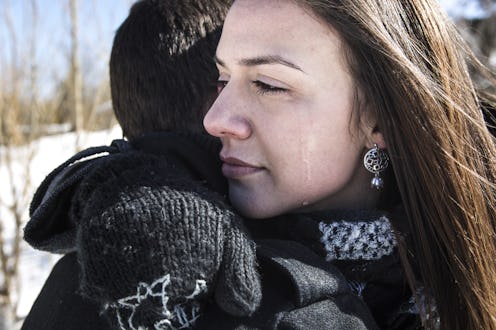
Being in a toxic relationship can make you feel like you're completely stuck. There's so much lying and gaslighting that it leaves you not knowing where you stand — what's real or not real. It's hard to keep your head on straight, and even harder to figure out what you can do to make your relationship better.
First and foremost, you should be putting yourself first. Protecting yourself — and being realistic about whether or not this is a relationship you should even be in — should come before anything else. But if you are in this sort of a relationship, there are things you can try and do to minimize the damage and protect yourself at the same time. And that will help your partner, by making it clear what they're doing isn't OK.
Although toxic relationships can come in a lot of different forms, any form of abuse should never be tolerated, obviously. They can be manipulative, controlling, involve a lot of deceit or infidelity. Despite the differences from relationship to relationship, there is a common core in a lot of toxic relationships: they weigh you down, make you feel trapped, and make you doubt yourself. There's a lot of manipulation and a sense of panic that something isn't quite right.
Here's what you can do to help you partner be less toxic, but remember to put yourself first:
1. Stay Calm
During a fight, even if your partner loses their temper, it's important to stay as calm and collected as possible. Two people shouting angrily doesn't achieve anything. And if you stay calm and gather yourself, you're more likely to be able to articulate the problem in a constructive way.
2. Be Honest
Especially if your partner has a tendency to manipulate with guilt, or always acts like their behaviors are totally justified or that they couldn't possible act any other way, it can be really difficult to stand up to them when there behavior isn't OK. But if you just keep letting them get away with it, then there's no reason for them to change, and it will just make them feel more entitled to their bad behavior.
3. Explain How It Makes You Feel
If they're not going to believe that they've done anything wrong or try to make you feel guilty, it's best if— instead of accusing them and putting them on the defensive — you talk about how things make you feel. It's a lot harder for someone to argue with your feelings. It helps to give some perspective.
4. Have Clear Boundaries
If you have certain behaviors that you've made clear aren't OK and you're not going to put up with them — don't. It sounds simple, but it's amazing how many things you can say you won't stand for and then, there you are, putting up with it. Saying what isn't cool means nothing if they always get away with it— whether it's lying, being detached, cheating, whatever. There has to be a clear consequence, even if that's you just making it clear it upsets you.
5. Check In With Friends
Because of all of this confusion, no matter how hard you try to stick to your guns, you can start to loose perspective. If you know you're with someone who tends manipulate and gaslight you, it's important to seek advice from friends and people who care about you. They'll be able to help you regain some perspective and tell you're enabling or dealing with behavior you shouldn't. You need them to keep you grounded and make sure you're not being too sucked in.
6. Leave If You Have To
Sometimes, it's the only option. You should never let trying to be a good person or the desire to help someone keep you in a toxic or bad relationship. You can give someone a second chance and maybe it will get better, but at some point you have to take care of yourself. If that means leaving — go. Do it. Not only do you need to do it for yourself, but it may actually be the only chance you'll have left to help a toxic person. It's the ultimate way of showing you won't put up with their behavior, and maybe they'll learn for next time.
Editor's Note: Even if you don't think your relationship is abusive, but you feel like you need help getting out or figuring out what to do next, call the National Domestic Violence Hotline at 1−800−799−7233. You're not alone.
Want more of Bustle's Sex and Relationships coverage? Check out our new podcast, I Want It That Way, which delves into the difficult and downright dirty parts of a relationship, and find more on our Soundcloud page.
Images: Fotolia; Giphy (6)